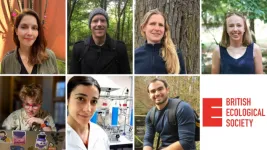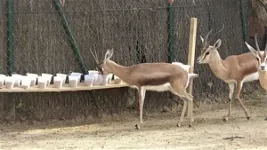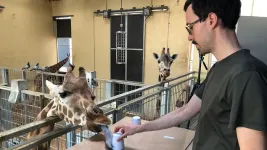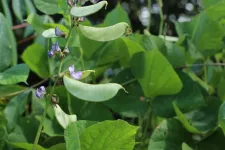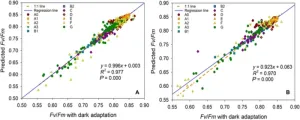The winning papers are selected by the Senior Editors of the journals and the awards will be presented to the winners at the BES Annual Meeting in Belfast at the end of the year.
The winners receive a prize of £250, membership of the BES, a year’s subscription to the respective journal, and free attendance to the BES Annual Meeting to present their work and receive their award from the President of the BES.
This year’s exceptional winning papers span topics as diverse as mapping mosquito borne diseases, the importance of under-threat mosses in tropical mountain cloud forests, and mapping the areas sensitive to plant invasions.
The journal prize winners are as follows:
The Southwood Prize: Paula Prist, EcoHealth Alliance
The Southwood Prize is awarded each year for the best paper in the Journal of Applied Ecology written by an early career author at the start of their research career.
Dr. Paula Prist from EcoHealth Alliance has been awarded this year’s prize for their paper: Roads and forest edges facilitate yellow fever virus dispersion
In their winning study, Paula and co-authors explored how landscape structure affects yellow fever virus dispersion through its vector, mosquitoes. Understanding this can aid better landscape planning and better organisation of vaccination campaigns.
Paula and co-authors found that yellow fever virus disperses on average 1.42 km every day and uses roads adjacent to forest areas and forest edges along agricultural areas to disperse. In contrast, core areas of forest regions were found to be important barriers for virus movement.
The Georgina Mace Prize: Luke Potgieter, University of Toronto Scarborough
The Georgina Mace Prize is awarded each year for the best paper in the journal Ecological Solutions and Evidence written by an early career author at the start of their research career.
Luke Potgieter from the University of Toronto Scarborough has been awarded this year’s prize for their paper: Prioritizing sites for terrestrial invasive alien plant management in urban ecosystems
Luke’s winning study combined aspects of social science, geography and ecology to pinpoint which areas across the Toronto region are most sensitive to plant invasions. The analysis revealed high priority sites as those of significant biodiversity conservation value, and that a large proportion of these priority areas are already heavily invaded.
Research like Luke’s is important as there is an urgent need to protect and manage areas impacted by biological invasions. What’s more, limited resources call for the strategic prioritisation of these areas.
The Haldane Prize: Aya Permin, University of Copenhagen
The Functional Ecology Haldane Early Career Researcher Award is given is given each year to the best paper in the journal from an early career author.
Aya Permin from the University of Copenhagen has been awarded this year’s prize for their paper: High nitrogen-fixing rates associated with ground-covering mosses in a tropical mountain cloud forest will decrease drastically in a future climate
Aya’s research reveals the importance of bryophytes (mosses and liverworts) as a nitrogen source in tropical mountain cloud forests. Nitrogen is a critical nutrient for plant productivity growth but its availability is often limited. This has led to the evolution of mutualistic partnerships between certain plants and nitrogen-fixing bacteria. Until now, the role of bryophytes in ecosystem nitrogen cycling has been largely overlooked.
Worryingly, the findings from Aya’s research suggest that predicted future declines in precipitation in tropical mountain cloud forests will reduce nitrogen inputs from bryophytes. Research in this area, like Aya’s, can help inform conservation efforts to preserve these critical ecosystems.
The Rachel Carson Prize: Michelle Evans, University of Georgia
This award is given each year for the best paper in the journal People and Nature written by an early career author at the start of their research career. The winner is selected by the Senior Editors of the journal.
Michelle Evans from the University of Georgia has been awarded this year’s prize for their paper: Socio-ecological dynamics in urban systems: An integrative approach to mosquito-borne disease in Bengaluru, India
Michelle’s research combined field sampling of mosquitoes with in depth-interviews of local people in Sarjapur, India, an area experiencing a high burden of mosquito borne diseases. The research showed that people’s everyday experiences of mosquitoes were influenced by how they moved around and used outdoor space.
The study’s combination of ecological and social approaches gives insight into how communities can manage mosquito-borne diseases. Michelle hopes that the study will demonstrate the benefits gained from integrative ecological work and will serve as the impetus for similar projects in the future.
The Robert May Prize: Tanya Strydom, University of Montreal
The Methods in Ecology and Evolution Robert May prize is awarded annually to the best paper submitted by an early career author at the start of their research career.
Tanya Strydom from the University of Montreal has been awarded this year’s prize for their paper: Food web reconstruction through phylogenetic transfer of low-rank network representation
Tanya’s winning research utilised knowledge from one network of organisms to make predictions for what a network in a completely different location might look like. This is useful to ecologists as there is a shortage of interaction data, mostly because sampling interactions in the field is hard.
In the paper, Tanya and co-authors used the known interactions for European mammals and used this knowledge to construct a network of probabilities for Canadian terrestrial mammals. The hope is that the framework developed in this study will help ecologists to use the interaction data we do have, to create plausible networks for less well studied areas.
The Harper Prize: Angela Illuminati, University Rey Juan Carlos
The John L Harper Early Career Researcher Award is given each year to the best paper in the Journal of Ecology by an early career author at the start of their career.
Angela Illuminati from the University Rey Juan Carlos has been awarded this year’s prize for their paper: Coordination between water uptake depth and the leaf economic spectrum in a Mediterranean shrubland
Angela’s research provides a new perspective on the links between water and nutrient use in a semiarid Mediterranean plant community.
Understanding plant functional strategies related to water and nutrient use is especially relevant in dryland environments. The low availability of soil resources are a strong limiting factor for plant survival in these areas and is a main driver of species competition and coexistence.
The Elton Prize: Pablo Augusto Antiqueira, University of Campinas
The Elton Prize is awarded each year for the best paper in the Journal of Animal Ecology written by an early career author at the start of their research career.
Pablo Augusto Antiqueira from the University of Campinas has been awarded this year’s prize for their paper: Warming and top predator loss drive direct and indirect effects on multiple trophic groups within and across ecosystems
Little is known about how climate change and biodiversity loss will impact specific interactions within ecosystems. To increase our understanding of this, Pablo’s winning study looked at tank-bromeliads, a neotropical plant that supports a rich fauna of microorganisms, making them a natural microecosystem.
The study evaluated how an increase in temperature and top predator loss would impact different areas of the food web in this micro-ecosystem. Pablo and co-authors found impacts at each level of the food web. The results provide new evidence for how anthropogenic changes predicted for the following decades could affect different groups of organisms across ecosystems.
-ENDS-
END
